|
|
|
Sort Order |
|
|
|
Items / Page
|
|
|
|
|
|
|
| Srl | Item |
| 1 |
ID:
120672
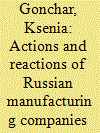

|
|
|
|
|
| Publication |
2013.
|
| Summary/Abstract |
This essay explores the nature of the 2008 crisis and the channels through which it affected the performance of firms in Russia. Based on the findings of a manufacturing industry survey, the evidence suggests that all manufacturing firms were affected by the crisis and that there is no single and dominant transmission channel. Crisis reactions were significantly related to participation in international markets, although participation in trade, in external borrowing or FDI cannot explain recession by themselves. The reversal of growth was mainly caused by demand shock and, following that, by financial constraints. Thus the hypothesis that blames overheating of internal demand in the years prior to the crisis seems to receive statistical backing. Globalised companies, though hit by external shocks, were better prepared to pay the cost and balance the consequences of the crisis.
|
|
|
|
|
|
|
|
|
|
|
|
|
|
|
|
| 2 |
ID:
180047
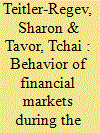

|
|
|
|
|
| Summary/Abstract |
COVID-19 pandemic created a health emergency that led to a huge global economic crisis. This article examines the effects of a wide range of variables including the number of infections, deaths, and recoveries, as well as categorical variables like public behaviour and government restrictions on stock indexes on 16 different countries. It compares the situation in Israel with the other explored countries. The regression analysis revealed that while in Israel all the variables affected stock-index returns, in the other countries only a few of the variables did so.
|
|
|
|
|
|
|
|
|
|
|
|
|
|
|
|
| 3 |
ID:
118160
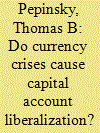

|
|
|
|
|
| Publication |
2012.
|
| Summary/Abstract |
A central argument in the literature on economic crises and policy reform is that currency crises lead governments to liberalize their capital accounts in order to establish their credibility to international markets. I argue that the reverse is true: currency crises lead governments to restrict capital flows as a form of self-help. Using instrumental variables to account for the possibility that capital account liberalization causes currency crises, I show that currency crises are robustly associated with capital account closure across developing countries. The findings refocus the debate on currency crises and capital account liberalization and contribute to larger debates about the role of critical junctures in prompting neoliberal policy reform.
|
|
|
|
|
|
|
|
|
|
|
|
|
|
|
|
| 4 |
ID:
095026
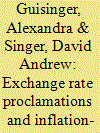

|
|
|
|
|
| Publication |
2010.
|
| Summary/Abstract |
If governments choose economic policies that often run counter to their public commitments, are those commitments meaningless? We argue that government proclamations can be critical in signaling economic policy intentions. We focus on the realm of exchange rate policy, in which countries frequently implement an exchange rate regime that differs from the officially declared regime. We argue that the official exchange rate regime is one of the most important signals of a government's economic policy preferences. When a government makes a de jure public commitment to a fixed exchange rate, it sends a signal to domestic and international markets of its strict monetary-policy priorities. In contrast, a government that proclaims a floating exchange rate signals a desire to retain discretion over monetary policy, even if it has implemented a de facto fixed rate. We use data on 110 developed and developing countries from 1974 to 2004 to test two hypotheses: first, that governments that adopt de facto fixed exchange rates will experience less inflation when they back up their actions with official declarations; and second, that governments that abide by their commitments-as demonstrated by a history of following through on their public declarations of a fixed exchange rate regime-will establish greater inflation-fighting credibility. Within developing countries, democratic institutions enhance this credibility. Results from fixed-effects econometric models provide strong support for our hypotheses.
|
|
|
|
|
|
|
|
|
|
|
|
|
|
|
|
| 5 |
ID:
118178
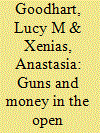

|
|
|
|
|
| Publication |
2012.
|
| Summary/Abstract |
Can monetary policy, and the exchange rate, affect military capability? If weapons systems are purchased on international markets, then a depreciating currency can reduce the import of arms, affecting the relative capabilities of military rivals. In this research note, we analyze the demand for arms imports using an error correction model. We show that arms are a "normal" good, with the quantity demanded directly related to price and with exchange rates serving as an instrument for price movements that are normally unobserved. Such price movements are increasingly important given currency volatility and a reliance on imported technology.
|
|
|
|
|
|
|
|
|
|
|
|
|
|
|
|
| 6 |
ID:
109459
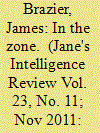

|
|
|
| 7 |
ID:
158541


|
|
|
|
|
| Summary/Abstract |
China has witnessed an unprecedented urban revolution, manifested by rapid urbanization and massive migration that have driven the proportion of urban population above 50 percent.1 Along with the expansion of cities, millions of migrants move across the rural and urban boundaries, between different regions, and beyond the limits of the household registration status (戶口 hukou). From 1982 to 2010, the number of cities increased from 244 to 654, and the number of rural-hukou migrants in urban areas increased from 46.5 million to 205.6 million.2 The expansion of urban areas and population has been characterized not only by its scale and rapidity but also by the high degree of spatial variability. Under the market-oriented reforms, China's eastern coastal areas, or "early-developed" regions, were "opened up" first and have benefited from preferential policies.3 Some coastal and major metropolises like Beijing,
|
|
|
|
|
|
|
|
|
|
|
|
|
|
|
|
| 8 |
ID:
130804


|
|
|
|
|
| Publication |
2014.
|
| Summary/Abstract |
The issuance of US$ 2 billion worth of Eurobonds has been lauded as the Pakistani economy's remergence in the international market.Is that the real story, or is the PML-N government reverting to the old practice of incurring more debt to retire older debt?
|
|
|
|
|
|
|
|
|
|
|
|
|
|
|
|
| 9 |
ID:
138298


|
|
|
|
|
| Summary/Abstract |
We develop and test a theory, based on the Stolper–Samuelson Theorem, of the effectiveness of sanctions. We treat sanctions as exogenously imposed changes in a country's exposure to international markets. In a country with an open-trade regime, owners and intensive users of the abundant factor of production hold economic and political power. In a country closed to trade, however, economic and political power rests with owners and intensive users of scarce factors. Thus, if real rates of return to the abundant factor decline during sanctions against a trade-open country, or real rates of return to the scarce factor decline during sanctions against a trade-closed country, we expect these economically and politically powerful segments of the targeted country to push hard for policy changes that would bring about an end to sanctions. Statistical analysis of sanctions episodes initiated between 1971 and 2000 provides support for the paper's expectations.
|
|
|
|
|
|
|
|
|
|
|
|
|
|
|
|
| 10 |
ID:
171446
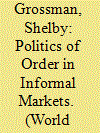

|
|
|
|
|
| Summary/Abstract |
Property rights are important for economic exchange, but in many parts of the world, they are not publicly guaranteed. Private market associations can fill this gap by providing an institutional structure to enforce agreements, but with this power comes the ability to extort from group members. Under what circumstances do private associations provide a stable environment for economic activity? The author uses survey data collected from 1,179 randomly sampled traders across 199 markets in Lagos, Nigeria, and finds that markets maintain institutions to support trade not in the absence of government, but rather in response to active government interference. The author argues that associations develop protrade policies when threatened by politicians they perceive to be predatory and when the organizations can respond with threats of their own. The latter is easier when traders are not competing with one another. To maintain this balance of power, an association will not extort; it needs trader support to maintain the credibility of its threats to mobilize against predatory politicians.
|
|
|
|
|
|
|
|
|
|
|
|
|
|
|
|
| 11 |
ID:
129666
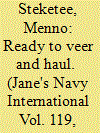

|
|
|
| 12 |
ID:
124428
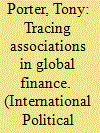

|
|
|
|
|
| Publication |
2013.
|
| Summary/Abstract |
Four decades ago, when financial globalization was attracting widespread attention, the few theoretical frameworks that were available to analyze it were relatively simplistic. Often, it was seen as an unstoppable quasi-natural expression of the expansion of market forces, operating independently of state power, which it was undermining. Today there is a rich variety of frameworks which help us understand the immensely complex entanglements of power, states, markets, and international institutions that constitute and govern global finance, including some insightful uses of actor-network theory (ANT) (for instance, Langley 2006; Best forthcoming 2013). In this contribution I highlight a number of unique contributions that ANT makes to our understanding of global finance.
|
|
|
|
|
|
|
|
|
|
|
|
|
|
|
|
| 13 |
ID:
118179
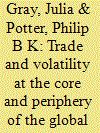

|
|
|
|
|
| Publication |
2012.
|
| Summary/Abstract |
Researchers typically assume that economic openness increases volatility. But the conventional empirical shorthand for economic openness (trade as a share of overall income) fails to account for crucial distinctions in the way that states trade. States that are deeply incorporated into the core of the international trading network have very different experiences than states at the periphery with fewer, more marginalized trading partners. This article demonstrates that a position at the core of the international trading system rather than the periphery actually diminishes volatility. Thus, a country's position in the world economy can, independently of its overall volume of trade, moderate the risks of exposure to international markets. To demonstrate how this distinction might impact political outcomes and future scholarship, we show that this reduction in volatility allows governments to minimize compensation to their domestic publics.
|
|
|
|
|
|
|
|
|
|
|
|
|
|
|
|
| 14 |
ID:
130938
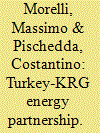

|
|
|
|
|
| Publication |
2014.
|
| Summary/Abstract |
Ten years after the U.S. invasion and two years after the complete withdrawal of American forces from its soil, Iraq faces a number of challenges to its long-term stability and development. These range from corruption to poor public services, from rising terrorist violence to ethnosectarian tensions in the context of a complex power-sharing system. An important, but often overlooked, aspect of Iraq's political scene concerns the dispute between the federal government and the Kurdish Regional Government (KRG) over the management of the country's and the Kurdish region's natural resources and over appropriate revenue-sharing mechanisms. The parties have been stuck in a costly political stalemate for the past few years, as the absence of a federal hydrocarbon law has discouraged international investment in Iraq's natural resources, and oil extracted from KRG-controlled fields has had only intermittent access to international markets.
|
|
|
|
|
|
|
|
|
|
|
|
|
|
|
|
| 15 |
ID:
121962
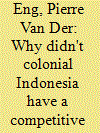

|
|
|
|
|
| Publication |
2013.
|
| Summary/Abstract |
This paper quantifies the consumption and production of cotton textiles at different stages of processing in Indonesia during the Dutch colonial era (1820-1941). It discusses the main factors that impeded the development of an internationally competitive cotton textile industry, and concludes that production in the industry increased significantly in Java during 1820-71, and again during 1874-1914 and 1934-41. However, most activity involved finishing of imported cotton cloth to suit local preferences. Spinning and weaving increased only marginally, as domestic production was precluded by the high-labour intensity of small-scale production, marginal local raw cotton production, and competitive international markets for yarn and cloth. Unfavourable and fluctuating real exchange rates discouraged investment in modern spinning and weaving ventures until trade protection and technological change in small-scale weaving caused rapid growth of domestic production after 1934.
|
|
|
|
|
|
|
|
|
|
|
|
|
|
|
|
|
|
|
|
|